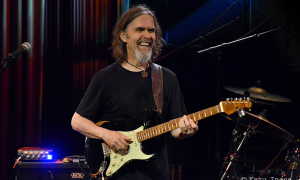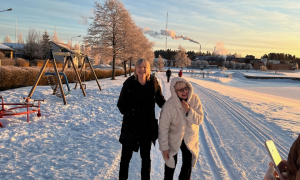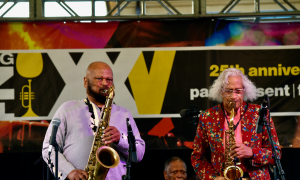Home » Jazz Articles » SoCal Jazz » The Weckl/Kennedy Project: Live at The Catalina Jazz Club
The Weckl/Kennedy Project: Live at The Catalina Jazz Club

Courtesy Bob Melvin
Are you trying to confuse the drummer?
—Dave Weckl
Tom Kennedy
bass, electricb.1960

Dave Weckl
drumsb.1960

Bob Franceschini
saxophone, tenorb.1961

Stu Mindeman
piano
John Pizzarelli
guitarb.1960
The Catalina gigs followed a very successful European tour. Every tune played was from the Tom Kennedy compositional vault. All new material at that. It was finally time to tell his Stories (Autumn Hill Records, 2021). Because of the pandemic Kennedy didn't have the opportunity to tour and share the music from this endeavor until now. Having become quite familiar with the record, it was a treat to hear it played live. Weckl played on the record as well. Although Franceschini and Mindeman did not. For the record (no pun intended) Stories does feature a few artists you may be familiar with.

Randy Brecker
trumpetb.1945

Mike Stern
guitarb.1953

Ada Rovatti
saxophone, tenorb.1976
Jay Oliver
keyboardsJust like the CD, they opened the set with a tune called "Hurry Up!" As the name suggests it is played at break neck speed. No warm-up, get-in-the-mood stuff here. They came out smoking, and never really let up. "Hurry Up!" allowed all four musicians to dig in and play with abandon from the get-go. The gloves were off and they jumped right into a recently penned new story from Kennedy. "Hipshot," which will be released on a new record this fall, kept the inferno lit. Kennedy took a moment to mention his longtime appreciation of the

Yellowjackets
band / ensemble / orchestrab.1977

Jimmy Haslip
bassb.1951
The title track followed. "Stories" is rich and melodic. It was quite the foundation for Weckl, Franceschini, and Mindeman to elevate from. It sounds cliched, but Weckl put on a clinic. Before kicking into the song, Weckl, with comical admiration, said to Kennedy, "Are you trying to confuse the drummer?" The reference was in regard to the South African rhythmical complexities in the composition. Forever pushing and challenging each other musically, Kennedy wrote to Weckl's strengths. Kennedy explained after the show that in South African music they use the second triplet in the beat, which is unusual in western music. Indeed, the song could have just as easily been called "Triplet Mania." Many of the accented rhythms in Kennedy's compositions are based on these offbeats that appear at different times from measure to measure. Shuffling between tenor and soprano through the entire set, Franceschini's note selections told a vivid part of the story. As well. Mindeman was the X factor. While a very fine keyboard player, the dynamics of his keyboard programming often brought the feel of a larger ensemble. Then just as smoothly back into the texture of a quartet. "BB's Blues" is the consummate show stopper. Although, on this night they were far from finished.
Franceschini and Mindeman walked off the stage. "It's not that we don't like them," Kennedy joked. "They will be back." Stunning is a word that comes to mind in describing what happened next. It was at this moment that Weckl made the heartfelt comments about their shared youth that was referenced earlier. "What we did back then," Weckl began, "is that I would start out with an unplanned rhythmic motif, that Tom would then come in on with free harmonic choices." The freedom to just play, learn, and have fun. A young musician's paradise that led to upper echelon musical careers and a lifetime friendship. How very special to be able to celebrate that with a "Hand in Hand" duet. Just like all those years ago, Weckl turned the clock back and just played what he felt in the moment. He clearly had a lot of feelings and emotions swirling in his head and through his kit, as Kennedy then became the kid in the candy store. Kennedy smiled warmly in the moment as he slid into harmonic key choices that were as random as Weckl's finery. Together they broke into increasingly faster rhythmic changes. Kennedy related that "the phases of this improv reflected their early experimental phases of growth as young musicians. This was a playful glimpse." It was a beautiful thing to see these now virtuosic musicians still be able to make each other smile and even laugh out loud at their unexpected random choices.
With Franceschini and Mindeman back in the fold, the quartet returned to Kennedy's Stories. "Next we would like to play a song about the 1970s, stated Kennedy. "It's called "The '70s." With a laugh, we were back to bell bottoms and water pipes. Many in the crowd were old enough to remember the seventies. We all smiled and took a relaxing breath as the vibe of that era in our history was groovy from the outset. They closed with another song from the forthcoming record. The quartet jelled and improvised through a spiced up Latin groove. "Espiritu Del Songo" let all four artists have the freedom of note selections to bring the house down with both energy and expressionism. It was the perfect vehicle for Kennedy and Weckl to push and leave nothing on the table... and of course have fun doing it. Known for his powerful command of the electric bass, Kennedy brought a superbly unique flavor, while Weckl seemed to have eight limbs flying around his kit, additionally bringing the complete sound of a percussionist to the mix. Weckl has had the opportunity to work with many of the industry's finest bassists, including

Anthony Jackson
bass, electric
Will Lee
bassb.1950

Jimmy Johnson
bassb.1930

John Patitucci
bassb.1959

Mike Stern
guitarb.1953
Tags
SoCal Jazz
Tom Kennedy
Jim Worsley
United States
California
Los Angeles
Dave Weckl
Bob Franceschini
Stu Mindeman
Ray Kennedy
John Pizzarelli
randy brecker
Mike Stern
Ada Rovatti
Jay Oliver
yellowjackets
Jimmy Haslip
Anthony Jackson
Will Lee
Jimmy Johnson
John Patitucci
Comments
PREVIOUS / NEXT
Support All About Jazz
 All About Jazz has been a pillar of jazz since 1995, championing it as an art form and, more importantly, supporting the musicians who make it. Our enduring commitment has made "AAJ" one of the most culturally important websites of its kind, read by hundreds of thousands of fans, musicians and industry figures every month.
All About Jazz has been a pillar of jazz since 1995, championing it as an art form and, more importantly, supporting the musicians who make it. Our enduring commitment has made "AAJ" one of the most culturally important websites of its kind, read by hundreds of thousands of fans, musicians and industry figures every month.
Go Ad Free!
To maintain our platform while developing new means to foster jazz discovery and connectivity, we need your help. You can become a sustaining member for as little as $20 and in return, we'll immediately hide those pesky ads plus provide access to future articles for a full year. This winning combination vastly improves your AAJ experience and allow us to vigorously build on the pioneering work we first started in 1995. So enjoy an ad-free AAJ experience and help us remain a positive beacon for jazz by making a donation today.

Los Angeles
Concert Guide | Venue Guide | Local Businesses
| More...







 Buy Now
Buy Now























